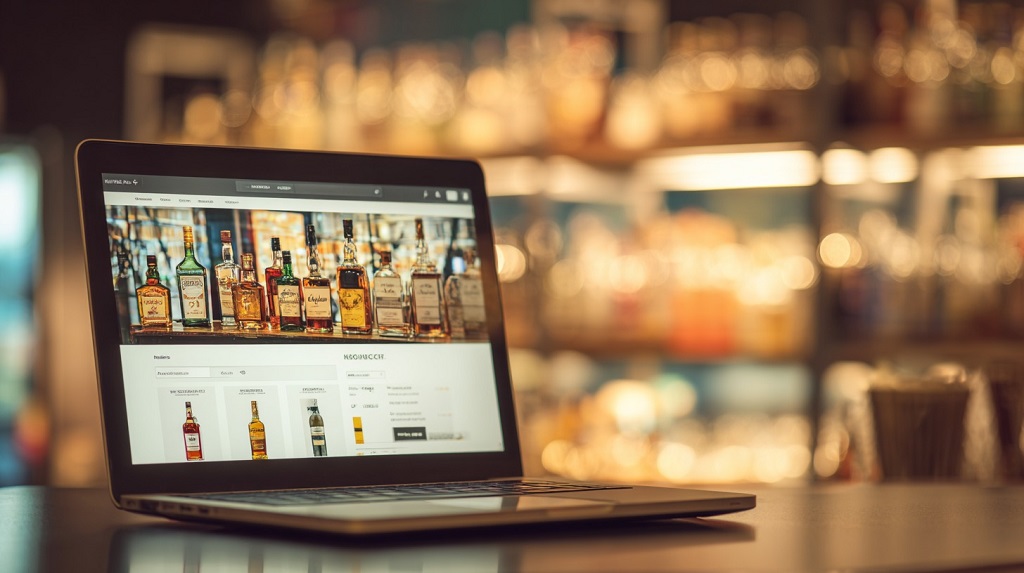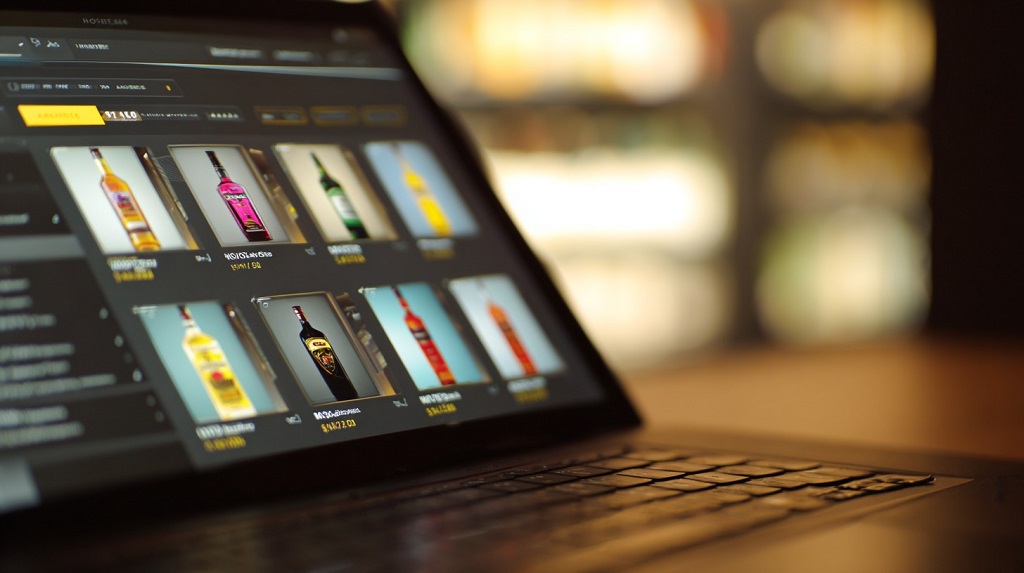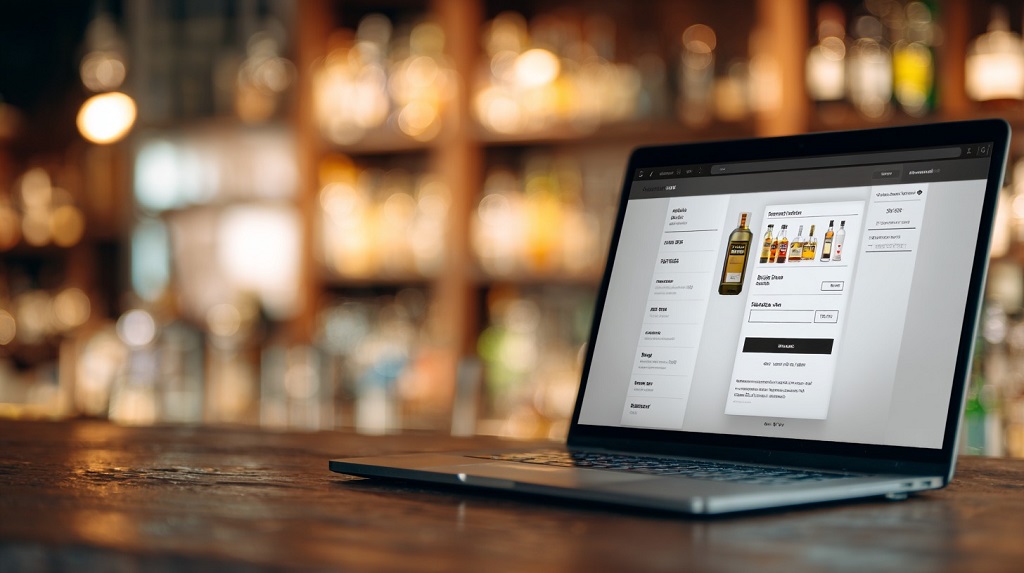Online liquor sales have surged in recent years, driven by shifting consumer behavior and technological convenience. Entrepreneurs eyeing the alcohol e-commerce sector see a massive opportunity with high growth potential.
Yet, legal hurdles remain complex and demand thorough navigation.
Success depends on fully respecting regulatory boundaries while strategically setting up operations to attract and retain a loyal customer base.
Know the Prohibited and Restricted Shipping Areas

Launching an online liquor business begins with identifying where shipping is off-limits. Several states completely prohibit the direct shipment of alcohol to consumers. These include:
- Alabama
- Arkansas
- Mississippi
- Oklahoma
- Utah
In addition to these, a handful of states operate under limited reciprocity agreements. These states may only allow shipments from in-state producers or restrict shipments from specific out-of-state retailers based on their own licensing rules.
Granholm v. Heald (2005) changed the legal landscape by addressing how states regulate interstate alcohol sales. Despite the ruling against discriminatory practices favoring in-state producers, states continue to enforce various interpretations that complicate cross-border logistics.
Compliance means maintaining up-to-date knowledge on state-specific regulations and ensuring that shipments adhere to those legal standards.
Ignoring these restrictions risks license revocation, hefty fines, or even criminal liability. A compliance map with automated shipping filters can help restrict sales where prohibited.
Consulting legal counsel when expanding into new states ensures your operations stay within lawful parameters.
Marketing and Sales Strategy (Within Legal Limits)

Marketing alcohol online comes with a unique set of legal restrictions that limit where, how, and to whom products can be promoted. Despite these boundaries, effective marketing is still possible. Success depends on combining creativity with compliance.
Reaching the right audience, building brand loyalty, and managing public perception require a thoughtful approach that stays within federal and state-level regulations.
Every message, ad, or campaign must be crafted with full awareness of the laws surrounding alcohol advertising.
Missteps can result in penalties, bans, or loss of licenses. A cautious, smart strategy not only protects your business but also fosters long-term relationships with responsible consumers.
Advertising Guidelines
Marketing alcoholic beverages comes with heavy restrictions. Avoid any content that:
- Appeals to underage individuals
- Suggests health benefits
- Promotes binge drinking or reckless behavior
Federal Trade Commission (FTC) rules and the Liquor Law Control Act (LLCA) impose strict standards. Digital ads must comply with platform-specific rules and display age-restricted warnings.
Use geotargeting to restrict ads in states that don’t allow alcohol delivery and never advertise without confirming platform policies. Review compliance weekly to prevent unintentional violations.
Customer Engagement Tools
Retaining loyal customers legally requires permission-based outreach. Email and SMS marketing require:
Clear opt-in methods
- Unsubscribe functionality
- Age confirmation at sign-up
Tools like Mailchimp or Klaviyo offer e-commerce-specific automation workflows tailored to alcohol retailers.
Additionally, platforms like SocialWick can help new liquor brands enhance their online visibility and boost social proof through real followers and engagement metrics.
While not a substitute for organic growth, these services can be strategically used to support brand perception during initial launch phases.
Loyalty programs are permitted in some jurisdictions but banned or limited in others. Check state laws before offering discounts, point systems, or exclusive perks.
CRM platforms that segment customers by order history, preferences, and geography enable personalized offers while staying compliant.
Reputation Management
Customer reviews, testimonials, and public feedback can help build trust in a heavily regulated industry. Encourage reviews post-purchase using email automation. Prompt resolution of negative feedback signals reliability.
Focus on Local SEO by claiming Google Business listings, maintaining NAP consistency (Name, Address, Phone), and gathering local backlinks.
Alcohol-specific ad networks and directories may offer higher conversion rates than general platforms. Test small ad budgets and track return on investment using analytics dashboards.
Implement Age Verification Protocols

Selling alcohol online requires robust safeguards to prevent underage sales. Age verification must occur both at the time of purchase and delivery.
Common methods include:
- ID Scan Upload: Customers upload a photo of government-issued ID, which is verified before the transaction is approved.
- Third-Party Age Verification Services: External databases validate buyer identity and age using public records.
- Facial Recognition and Biometrics: Some services add biometric checks for higher security, matching faces with uploaded IDs.
- Signature and Adult Verification at Delivery: Carriers like FedEx and UPS offer delivery confirmation protocols requiring an adult signature and photo ID.
In many jurisdictions, failing to verify customer age results in license penalties, suspension, or permanent closure.
Automation tools that flag suspicious transactions and enforce multiple verification steps reduce risk. Delivery staff should also be trained in spotting fake IDs and rejecting unauthorized deliveries.
Integrating these systems adds friction to the customer experience, but failing to implement them can shut down your business altogether. Choose tools that blend efficiency with compliance to protect both customers and your license.
Choose a Business Model and Fulfillment Strategy
Launching a legal and profitable online liquor store requires more than just sourcing and selling alcohol. Core decisions around your business model and fulfillment strategy determine operational efficiency, legal risk, profit margins, and customer satisfaction.
Clarity in business model planning helps prevent supply chain disruptions, ensures compliance with shipping laws, and allows your brand to stand out in an increasingly competitive space.
Product Offering

Deciding which type of alcohol to sell shapes your brand and influences logistics. Specialization helps in building authority and optimizing inventory.
Options include:
- Beer-only platforms that highlight craft brewers
- Wine-focused stores that cater to connoisseurs and casual drinkers alike
- Spirits-specific shops for higher margins and gift packaging
- Niche options like hard seltzers, canned cocktails, or non-alcoholic variants
Target market, profit margin expectations, and inventory rotation speed all affect the right product mix. Price-sensitive segments require large inventories and promotions, while luxury-oriented markets prioritize branding and packaging.
Supplier Model
Two primary models exist for inventory management:
- Dropshipping: You sell, the supplier fulfills. Reduces overhead but limits control over packaging and delivery timelines. Brand identity suffers without custom labeling or premium packaging.
- Wholesale Purchasing: Requires buying in bulk and storing inventory. Costs rise, but you gain higher profit margins, better branding opportunities, and more control over shipping timelines and customer experience.
Retailers should weigh the trade-off between margin and logistics complexity. States may also impose different licensing requirements depending on your fulfillment method.
Distribution & Packaging
USPS is not permitted to ship alcohol, so approved carriers like FedEx and UPS must be used. These carriers provide alcohol-specific services and ensure adult verification at delivery.
Shipping must comply with laws requiring:
- Tamper-evident packaging
- Clearly marked packages indicating alcohol content
- Sealed containers to prevent leakage or tampering
Records of interstate shipments must be stored for audit purposes, often for 3–5 years. These include details such as delivery date, recipient’s name and age, quantity, and carrier used. Software that logs these automatically can help avoid compliance lapses.
Build a Compliant and Functional E-commerce Store
Creating a seamless, legally compliant online store for liquor sales involves more than just uploading product images and enabling checkout. Every aspect, from user experience to backend operations, must align with both business objectives and regulatory expectations.
A well-designed store helps avoid legal pitfalls, ensures customer satisfaction, and establishes brand credibility in a tightly controlled industry.
Platform Selection
Platforms like Shopify, Ecwid, and Local Express offer customizable solutions suited for regulated products. Ensure your platform supports age gates, product restriction settings, and custom policies.
Design should support:
- Mobile-friendly checkout
- Easy category navigation
- Clear product descriptions and legal disclaimers
Invest in strong branding and UI/UX to reflect professionalism and build trust with customers.
System Integration
Point-of-sale (POS) systems should sync inventory in real-time, especially if a physical location complements your online store. Automate stock alerts and reorder thresholds to avoid stockouts or overstocking.
Alcohol-specific payment processors must be integrated, as not all providers support transactions involving controlled substances. Choose a merchant processor that explicitly accepts alcohol transactions, offers fraud detection tools, and complies with PCI-DSS standards.
Website Legal Features
Compliance starts at the landing page. Your site should include:
- Age Gate: A pop-up or embedded prompt requiring confirmation of legal drinking age
- Terms of Service and Privacy Policy: Include disclaimers related to alcohol, shipping limitations, and customer responsibilities
- Legal Warnings: Display Fetal Alcohol Spectrum Disorders (FASD) warnings and state-specific alcohol disclaimers
Legal footers, pop-ups for restricted shipping zones, and educational content about safe drinking practices enhance transparency and shield you from liability.
The Bottom Line
Launching an online liquor store in the US involves balancing regulatory constraints with entrepreneurial strategy.
Every decision, from fulfillment model to advertising copy, must align with local and federal laws.
A structured, legally compliant setup forms the foundation of long-term success.
Given the legal intricacies involved, consulting professionals in licensing, logistics, and e-commerce law is a smart investment in sustainability and scale.

